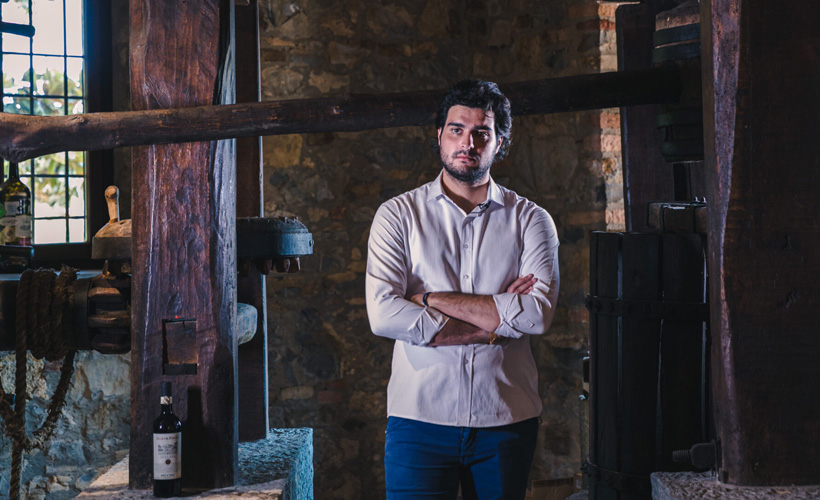Michelangelo Piccini discusses the future of the company, focusing on investments in agriculture and grape processing. The Piccini family is characterized by dynamism and continuous reinvestment. In the short term, the company will continue to focus on environmental and social sustainability and strengthen its presence in international markets. Exports, which account for 68 percent of sales, are crucial to the bottom line. The new generation is carrying on the family legacy with a future-oriented vision, without forgetting the value of tradition. The main challenges have been related to communication and changing production processes after the pandemic, with a focus on increasing material costs.
On what assets does the company intend to develop in the near future?
The medium-term vision includes a relative increase in investment at agricultural sector and on the grape processing stages. I believe that it is essential to always keep in mind in our business processes that the roots of our work are in the earth. Strengthening this aspect means, therefore, reconnecting with thehe raw material of our work, namely the vine and its fruit.
How is the Piccini family characterized in the economic context?
For five generations we have made dynamism our signature style. Of course, in order to fuel our projects and realize our visions it is necessary to reinvest constantly, with a view to supporting business development.
Do you foresee specific goals to be achieved in the short term?
In the immediate future, we will continue on the path we have already taken in terms of environmental and social sustainability. This commitment will be accompanied by the desire to corroborate our sales force in the territory, continuing, in addition, to participate in wine fairs and events.
The role of strategies to be adopted to develop the company in international markets and revive the business after the Covid-19 pandemic?
The consequences of the spread of Covid-19 have changed the rules of the game. Undoubtedly, the pandemic was one of the toughest tests for our company’s recent past; nevertheless, we came out of it responding to adversity with flexibility and planning.
Since we are already present in a wide range of foreign markets, our strategy focuses on creating new products, to be placed on the main sales circuits that arose during the pandemic. This is the case, for example, with our ‘Tuscan Coast’ line, designed mainly for the online sector, a channel that has received a significant surge in sales volume in recent years.
An inescapable starting point is the brand image and the value universe it manages to evoke in the consumer’s mind. Moreover, in recent years, we have espoused the cause ofs organic farming, attentive to respect for the earth. Atoday, consumers havedeveloped a strong social and environmental consciousness, with a focus on environmentally sustainable issues. Our commitment, in this case, is twofold: to ensure a product that meets new market needs while simultaneously lmimic the environmental impact as much as possible.
The critical issues to be addressed?
Obviously this is a path that presentsa Of the bumps along the way. First, it is crucial to understand and identify the new needs of our consumers and the changes in habits that have occurred due to the pandemic. Moreover, the spread of Covid-19 has caused us to look beyond the horizon, diversifying even more the sales channels through which we reach the consumer.
Anyway, and here I borrow some of my father’s words that I I share in full, we must always remember that especially in times of crisis it is people who make the difference. Therefore, even in a period that is far from rosy, such as the one we have experienced, we believe that it is essential to investing in human resources.
To what extent do exports affect the bottom line?
We ended 2021 recording a turnover of about 100 million, 68% of which was was generated by exports conducted outside national borders.
What role do young descendants take in the growth of the family business?
Receiving this legacy is undoubtedly an incentive, but also an enormous responsibility. Ohroughout time, each generation has left its own imprint, its own trademark. Me and my sisterswe tiptoed in, but we have every intention of making our mark, as our ancestors did before us. After all, as we always say, in Piccini we look forward, by tradition .
Our new prospects, combined with our father’s experience, represent a decisive springboard for the future of our company. Lhe Piccini formula for success is encapsulated in this very dynamic: listening to the past to write our future. Each generation of our family has always treasured past lessons while independently charting new courses.
The main challenges faced by the generational transition?
One of the first challenges we faced as we entered the company concerned the communication aspect. It became necessary to rethink the communication framework in 360 degrees, taking into account also the new horizons opened up by the digital world. On the wave of this renewal, he entered, in the early days of 2021, The impressive rebranding of our Wine Group. “Tenute Piccini” changed its look. at “Piccini 1882,” our new parent company that brings together the many souls of the company.
What are the complexities managed during intra-generational continuity?
Fortunately, I did not face any such complexities. The only initial stumbling block-which, however, I experienced more as a stimulus than a difficulty-was to Building credibility in the eyes of my colleagues, earning their trust.
The company’s future plans?
Our vision has always been clear: to be the most authentic and identifiable ambassador of Italian wine. In the immediate future, our roadmap includes., therefore, the acquisition and taking over management of additional vineyards, to be able to represent and popularize every corner of Italian excellence.
How does the change in production processes impact the Covid-19 pandemic?
The shocks of the pandemic profoundly affected production processes, still leaving after-effects. Indeed, the costs of packaging materials have risen significantly and are shown to be susceptible to further increases in the future. Barometer of these fluctuations is the cost of electricity, accomplice to the frightening rise in the price of natural gas, which powers most of Italy’s power plants.







